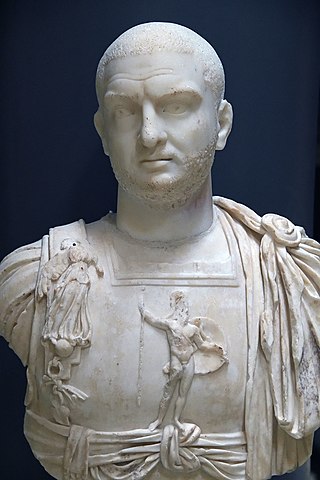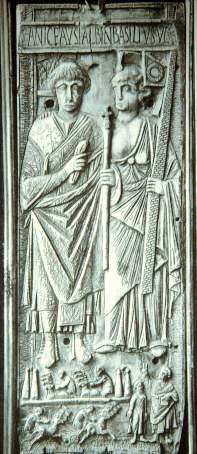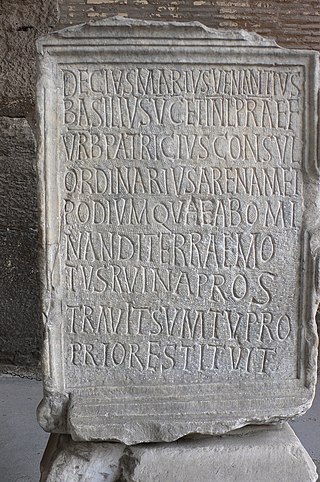Related Research Articles

Gaius Vibius Trebonianus Gallus was Roman emperor from June 251 to August 253, in a joint rule with his son Volusianus.
Procopius Anthemius was a politician of the Eastern Roman Empire, son of Western Roman Emperor Anthemius. After the death of the Eastern Roman Emperor Leo I, Procopius sided with his brother Marcianus's attempt to overthrow Zeno. When Marcianus's rebellion failed, Procopius fled to Thrace and then to Rome, returning to Constatinople after the death of Zeno and accession of Anastasius I. After his return to Constantinople, he was consul in 515.

Anicius Faustus Albinus Basilius was a high official of the Eastern Roman Empire and the last ordinary consul of Roman history, holding the office alone in 541.

The praetorian prefecture of Italy was one of four praetorian prefectures into which the Late Roman Empire was divided. It comprised the Italian peninsula, the Western Balkans, the Danubian provinces and parts of North Africa. The Prefecture's seat moved from Rome to Milan and finally, Ravenna.

Rufius Gennadius Probus Orestes was a Roman aristocrat. He was appointed consul of the Senate for the year 530, which he held alongside Flavius Lampadius. Johannes Sundwall believed Orestes was the son of Rufius Magnus Faustus Avienus, the consul of 502, and this view has been supported by more recent writers.
The gens Decia was a plebeian family of high antiquity, which became illustrious in Roman history by the example of its members sacrificing themselves for the preservation of their country. The first of the family known to history was Marcus Decius, chosen as a representative of the plebeians during the secession of 495 BC.
Caecina Decius Basilius was a politician of the Western Roman Empire, Consul and twice Praetorian prefect of Italy.
Caecina Mavortius Basilius Decius was a Roman politician under Odoacer's rule. He was consul and Praefectus urbi of Rome in 486 and Praetorian prefect of Italy from 486 to 493.
Gennadius Avienus was an influential politician of the Western Roman Empire. He was consul in 450, alongside Valentinian III. In 452, he was an envoy to Attila; together with Pope Leo I and Trigetius he successfully negotiated a truce. He had a son and a daughter; his son would go on to be consul in 490.

(Caecina) Decius Marius Venantius Basilius was a Roman official under Odoacer's rule.
Flavius Antoninus Messala Vivianus was an administrator of the Eastern Roman Empire.
The gens Caecinia was a plebeian family of Etruscan origin at ancient Rome. Members of this gens are first mentioned in the time of Cicero, and they remained prominent through the first century of the Empire, before fading into obscurity in the time of the Flavian emperors. A family of this name rose to prominence once more at the beginning of the fifth century.
(Decius) Basilius Venantius, was a Roman aristocrat who lived during Ostrogothic rule.
Flavius Avienus was a Roman politician during the reign of Theodoric the Great. He held the consulship with Pompeius as colleague in 501.
Rufius Petronius Nicomachus Cethegus was a politician of Ostrogothic Italy and the Eastern Roman Empire. He was appointed consul for 504 AD, and held the post without a colleague. His father was Petronius Probinus, the consul for 489 and prominent supporter of Antipope Laurentius.

Caecina Decius Maximus Basilius, was a Roman politician. He was the first consul appointed under Odoacer's rule (480), and afterwards was Praetorian prefect of Italy. He is best known for presiding over the papal election of Pope Felix III.
Caecina Decius Faustus Albinus was a Roman politician during the reign of Theodoric the Great. He held the consulship with Eusebius in 493. Albinus is best known for being identified with the senator whom Boethius defended from accusations of treasonous correspondence with the Eastern Roman Empire by the referandarius Cyprianus, only to have Cyprianus then accuse Boethius of the same crime.
(Decius) Paulinus was a Roman aristocrat and politician who served as the last consul of the Roman Senate. After his term, consuls would be appointed in the East alone.
Rufius Postumius Festus was a Roman aristocrat who lived during the Late Roman Empire. Festus was the last consul appointed by an Emperor in the West. The next consul appointed in the West was Caecina Decius Maximus Basilius, whom king Odoacer appointed in 480, eight years after Festus.
The gens Rufia, occasionally spelled Ruffia, was a minor plebeian family at ancient Rome. Members of this gens are not mentioned in history until imperial times, and they achieved little prominence until the late third century, from which time the family rose in importance, gaining the consulship on a number of occasions from the time of Constantine the Great to that of Justinian, and frequently holding the post of praefectus urbi.
References
- ↑ Cameron and Schauer, "The Last Consul: Basilius and His Diptych", Journal of Roman Studies, 72 (1982), p. 128
- ↑ Raymond Davis, translator, The Book of Pontiffs (Liber Pontificalis) (Liverpool: University Press, 1989), p. 58. Procopius, De Bellus VII.20.18. Translated by H.B. Dewing, Procopius (Cambridge: Loeb Classical Library, 1979), vol. 4 p. 329